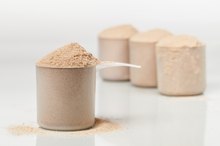Whey Protein Supplements & Urinary Irritation
Whey protein supplements can bolster your protein intake. Excessive whey protein, though, can cause as many problems as it solves. It's important to utilize whey protein as part of a healthy diet or you may experience side effects such as urinary irritation.
Caution
If you're experiencing urinary irritation, consult a doctor. Only proper testing determines the cause of your urinary symptoms and rules out sexually transmitted diseases and other more serious causes. Explain your diet, lifestyle and use of whey protein supplements to your doctor. Generally, urinary irritation associated with protein supplementation results from excess protein, putting unnecessary strain on the body. Whey protein is intended to supplement a diet to meet manageable goals, not push your protein intake passed the acceptable limits.
- If you're experiencing urinary irritation, consult a doctor.
- Whey protein is intended to supplement a diet to meet manageable goals, not push your protein intake passed the acceptable limits.
Recommended Protein and Supplementation
HCG Diet & Urinary Problems
Learn More
Most people need 50 g of protein daily to maintain a healthy lifestyle. Athletes and more active individuals may require between .5 and .9 g of protein per pound of body weight daily. Whey protein supplements run a wide range, but, generally speaking you'll get about 20 g of protein from a serving. Most Americans get enough protein from their diets alone. Supplementation and an already adequate diet can lead to excess protein that stresses the kidneys, induces dehydration and changes urine characteristics -- all of which can lead to urinary discomfort 1.
- Most people need 50 g of protein daily to maintain a healthy lifestyle.
- Whey protein supplements run a wide range, but, generally speaking you'll get about 20 g of protein from a serving.
Urine Composition
Many people associate high protein diets with muscle gain. Only physical activity can lead to muscle mass. Instead, excessive protein leads to changes in your urine, that could cause irritation of the urethra. Consistently high protein intake can lead to high levels of uric acid, ammonia and calcium in your urine. It can also cause reduced urine pH, meaning your urine becomes more acidic. All of these changes could lead to different urinary sensations or irritation, so it's important to use whey protein judiciously.
- Many people associate high protein diets with muscle gain.
- Instead, excessive protein leads to changes in your urine, that could cause irritation of the urethra.
Dehydration
Can Protein Supplements Cause Protein in the Urine?
Learn More
Ultimately, consuming too much protein can be very counterproductive to those using whey protein for athletic or training purposes. Excess protein results in the creation of nitrogen waste that must be carried out of the body. This causes the body to require more water. If the body's water needs aren't met, dehydration can ensue, causing urinary discomfort and fatigue, among other problems. Dehydration also increases the risk of urinary tract infections, which can cause serious urinary discomfort.
- Ultimately, consuming too much protein can be very counterproductive to those using whey protein for athletic or training purposes.
Other Considerations
Chocolate is considered a bladder irritant and could cause urinary irritation. Since many whey supplements are flavored with cocoa, this could explain some symptoms. Try switching to a different flavor. If you're using whey protein as part of a rigorous training regimen but do not think your intake is excessive, monitor your hydration during training. You may simply be failing to meet your body's normal hydration needs. Whey protein is derived from milk. If you've ever experienced any discomfort associated with dairy products, you should consider a soy supplement.
- Chocolate is considered a bladder irritant and could cause urinary irritation.
- If you're using whey protein as part of a rigorous training regimen but do not think your intake is excessive, monitor your hydration during training.
Related Articles
References
- University of Connecticut: Protein and Dehydration
- Gilbert, J.-A., Bendsen, N. T., Tremblay, A., & Astrup, A. (2011). Effect of proteins from different sources on body composition. Nutrition, Metabolism and Cardiovascular Diseases, 21, B16–B31. DOI: 10.1016/j.numecd.2010.12.008.
- Hulmi, J. J., Lockwood, C. M., & Stout, J. R. (2010). Effect of protein/essential amino acids and resistance training on skeletal muscle hypertrophy: A case for whey protein. Nutrition & Metabolism, 7(1), 51. DOI: 10.1186/1743-7075-7-51.
- Ridge, A., Devine, A., Lyons-wall, P., Conlon, J., & Lo, J. (2018). The impact of whey protein supplementation in older adults on nutrient intakes and satiety over an 11-week exercise intervention. Food Quality and Preference, 68, 72–79. DOI: 10.1016/j.foodqual.2018.01.013.
- Tahavorgar, A., Vafa, M., Shidfar, F., Gohari, M., & Heydari, I. (2014). Whey protein preloads are more beneficial than soy protein preloads in regulating appetite, calorie intake, anthropometry, and body composition of overweight and obese men. Nutrition Research, 34(10), 856–861. DOI: 10.1016/j.nutres.2014.08.015.
- Thomas, D. T., Erdman, K. A., & Burke, L. M. (2016). Position of the Academy of Nutrition and Dietetics, Dietitians of Canada, and the American College of Sports Medicine: Nutrition and Athletic Performance. Journal of the Academy of Nutrition and Dietetics, 116(3), 501–528. DOI: 10.1016/j.jand.2015.12.006.
- Zhu, K., Kerr, D. A., Meng, X., Devine, A., Solah, V., Binns, C. W., & Prince, R. L. (2015). Two-Year Whey Protein Supplementation Did Not Enhance Muscle Mass and Physical Function in Well-Nourished Healthy Older Postmenopausal Women. The Journal of Nutrition, 145(11), 2520–2526. DOI: 10.3945/jn.115.218297.
Writer Bio
Michael Tardiff began writing in 2007 at the University of Southern Maine "Free Press." He holds a Bachelor of Arts in media studies and English from the University of Southern Maine.









